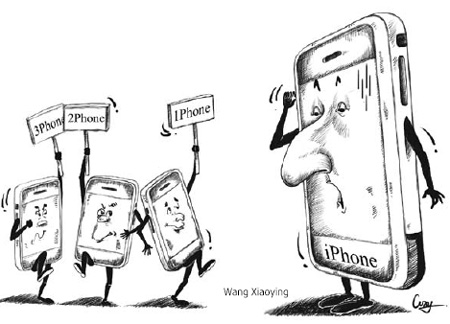Op-Ed Contributors
Brand culture in China should start with managers
By Mike Bastin (China Daily)
Updated: 2010-02-25 07:52
 |
Large Medium Small |
As China and Chinese companies continue to develop and compete in the global market place, surely it is about time we start to see the emergence of global Chinese brands?
Having taught brand management in China for more than 10 years, I continue to gain a real insight into the issues surrounding this most important aspect of modern business. First, let's remove any confusion about the definition of a "brand" and what distinguishes a "product" from a "brand":
A product is defined as a functional proposition with tangible features, for example, a digital camera or a mobile phone with camera and Internet access, a car with four-wheel drive and air conditioning. A brand combines this functional proposition with an emotional consumer experience, for example, Nokia "brings people together" and BMW represents "status", "success" and "power".
There are several branding myths. One is that branding requires heavy advertising: many successful brands, such as Starbucks, do not advertise. Another is that a brand must have a Western image. However, Tsingtao beer, one of China's most successful international brands, not only carries the name of a distinguished Chinese city but also uses Chinese history as a key part of its branding with pictures of the Great Wall and Confucius on its website. Many believe global branding requires a standardized brand but this is not the case. Kentucky Fried Chicken incorporates more and more very Chinese food offerings.
Consumers, especially Chinese consumers, are increasingly brand-focused. Research shows that consumers select only a few brands from which to choose within a product category rather than consider product features first. Some of my recent research with Chinese mobile phone consumers reveals clearly that they do not identify first the most desirable mobile phone features, such as Internet access, speed and camera, and then consider brand alternatives. Instead, Chinese consumers ring-fence only those brands considered acceptable, such as Nokia, Samsung, and then begin their decision making focusing only on these acceptable brands.
Successful brands create greater customer loyalty and as a result, higher profit. This is even more apparent during an economic downturn, when consumers continue to purchase the brands they really value and trust.
All successful brands first develop and maintain the highest product quality standards. For example, BMW has become an extremely powerful, fashionable brand. However, this has only been achieved as a result of consistently high levels of product quality, the foundation of all successful brands. Advertising and other marketing promotions will never build a brand without consumer trust in product quality.

While we see an increasing number of well-known Chinese companies, such as Haier, Lenovo, Huawei and Li Ning, we still do not observe the development of successful brands. Indeed, Lenovo recently announced a 20-percent reduction in its global workforce and Haier and Li Ning continue to experience extremely low brand awareness among US and European consumers.
Clearly, a sea change in Chinese business culture is required in order to move towards a brand-focused approach. With this in mind, the key point is the need for a brand manager role within Chinese organizations. Such a position is considered a foundation in any process towards a brand-oriented Chinese business culture.
The brand manager should report directly to the board of directors and probably directly to the chief executive officer but should not be a directorial appointment. The title brand director should not be used because this would not create the urgency required inside Chinese organizations regarding a more brand-focused business culture. Neither should the brand manager role be confused with the product manager, sales manager, market manager or advertising manager. Product management should continue to be responsible for functional product quality, whereas brand management builds on this with the development and maintenance of this 'emotional customer experience'.
Brand managers should not be a current, recent or even former marketing or advertising manager. This is to be avoided because such a person may not work well across other departments. In particular, advertising managers could easily resort to a purely advertising-led approach and neglect product quality management and the use of other more innovative promotions methods. Sales or marketing managers could also resort to a purely sales-led or marketing promotions-led approach.
A manager who has received multi-disciplinary training, for example an MBA graduate, and has worked successfully in many different departments and is financially literate should make a good brand manager.
A good brand manager should possess exceptional creative ability. It is often not necessary to spend huge sums building the brand. Smaller companies and even larger Chinese companies still do not have the financial resources to match the advertising and sponsorship spending on established Western brands. However, creative thinking can prove a successful way to building a brand without the need for huge financial investment.
A brand manager needs cultural awareness, understanding and linguistic ability, probably overseas experience and/or experience inside a Western organization. Chinese brands need to become more and more international and hopefully global which will undoubtedly require collaboration with companies and colleagues from a multitude of different cultures.
The key responsibilities of a brand manager include the establishment of a branding culture. Ongoing responsibility for a change in corporate culture is most definitely necessary within Chinese organizations, which may take some years to achieve.
He or she should also set up a brand management steering group. Such a team should consist of key managers from each functional area and meet regularly to monitor brand development across the entire organization. The brand manager should also have ongoing responsibility for the valuation of intangible brand value. All aspects of brand strategy should be under the authority of the brand manager. These include brand identity, naming, association, architecture and brand extension.
The author teaches brand management at the International College Beijing, affiliated to China Agriculture University.
(China Daily 02/25/2010 page9)













